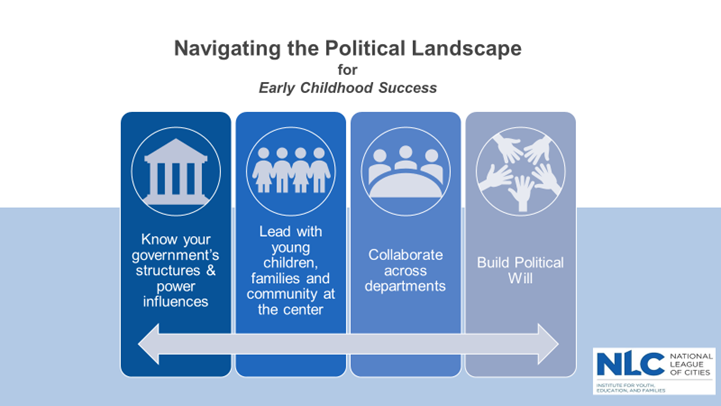With leadership transitions underway at every level of government, local leaders advocating for Early Childhood Success have much to navigate through to help ensure equitable recovery for children and families. To this end, local officials and community partners are deepening their understanding of governance structures and facilitating collaboration across government departments.

Last month, local leaders shared four key actions to take to successfully navigate the political landscape – we dive into each below.
Know your government’s structures & power influences
Governance structures inform process and power. It is important for champions of early childhood success to understand:
- Their type of local government and its impact on governance,
- Where formal and informal powers lie, how laws are passed, and if a city has home rule,
- Budget process, and
- Intersections between early childhood and municipal priorities.
As the saying goes, success begets success. “Help your leaders build on their predecessors’ legacies,” advises Tonja Rucker, NLC’s director of Early Childhood Success.
Lead with young children, families, and community at the center
Local early childhood systems include a diverse mix of public and private initiatives and require a commitment to work and coordinate across sectors to assess needs, identify shared goals and take effective action. City of Fort Worth Councilmember Kelly Allen Gray shares, “I still have hope, passion, and drive, that regardless of how we vote politically, we are here to serve the people and that is what it should be regardless.” Fort Worth is a founding partner of the collaboration, Early Learning Alliance which brings different partners together dedicated to improving learning outcomes for young children. “If you can get everyone to the table, and everyone starts talking, you realize you have more commonalities than differences,” said Councilmember Gray. “Good government figures it out and pivots to address the needs of everyone and works in partnership with others.”
Collaborate across departments
All municipal departments play a role in improving outcomes for young children and families even when it is not immediately apparent. Coral Manning, Early Care and Education Manager for the City of Madison works with colleagues in Community Development and City Planning, keeping connected with regular meetings to stay informed and actively looks for ways to support each other’s work. “Relationships are key to success in government,” said Manning. “Have the confidence to approach your elected officials and colleagues.”
Build political will
Supporting early childhood education and success is one thing everyone can get behind but may find difficult to put into action. “We need to be able to communicate what we mean by ‘high quality early learning’ and why it is important,” said Sarah Baray, CEO of Pre-K 4 SA, a program to improve the quality and quantity of pre-kindergarten education for 4-year-olds across the City of San Antonio.
Change happens when local leaders and their communities are aware of the needs, engaged in the issues, invested in solutions and stakeholders. It happens when families have a voice in community policy. In the City of San Antonio, effective and authentic communication with allies and across the community is a key strategy in building and continued support of their early childhood plan.
Keys for authentic communication:
- Own your city’s history and acknowledge the impact,
- Begin with the belief that families want the best for their families and are willing to do what it takes,
- Educate stakeholders on city government structure and processes.
- Use data to understand issues, advocate for support, identify strategies, and monitor outcomes. Then verify the data.
Local officials have shown their responsiveness, as the nation continues to work towards what is needed for young children, families, and communities. To be sure, the response and recovery of cities from the pandemic will be measured by young children reaching their full potential and their families living healthy lives.
Learn More
Join NLC for the third installment of Early Childhood Municipal Policy 101: Aligning City, County, and State Policies & Practices on April 22, 2021, at 2:00-3:00 pm ET. This series is designed to help leaders affect positive change in their communities through municipal policy.










